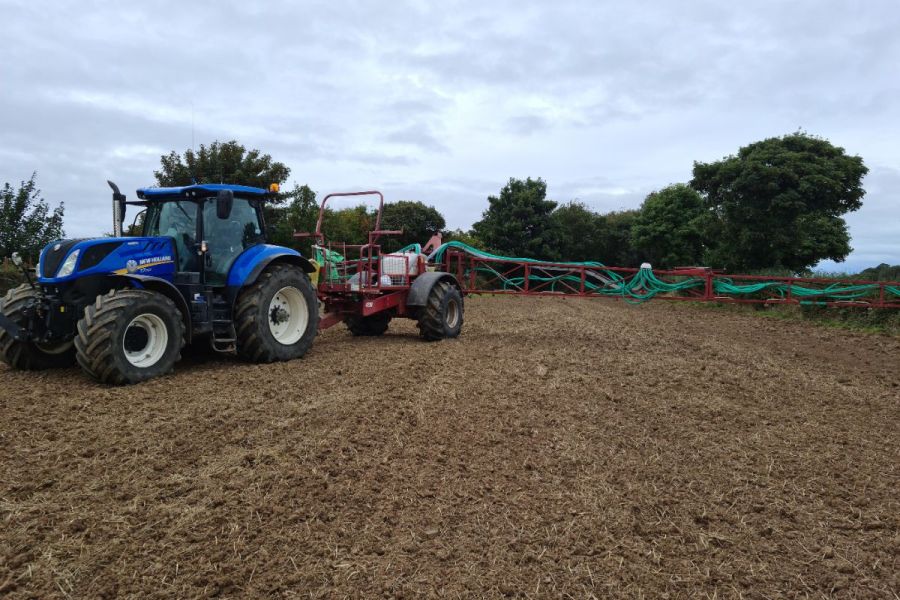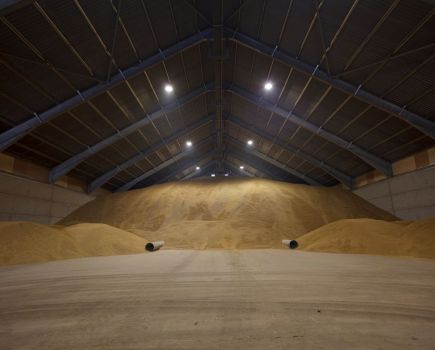Research aiming to explain the impact Avadex has on weeds from follow-up herbicide treatments has found how it links to its mode of action. CPM learns more about the science.
“It’s important to have this treatment at the beginning of herbicide programmes as it does influence the rest of the programme efficacy.”
By Mike Abram
Any grower who’s used Avadex (tri-allate) over its near 60-year life span will have likely come across claims that it makes weeds more susceptible to subsequent sprays in a herbicide programme.

By preventing or reducing the amount of wax on plant leaves, Avadex increases susceptibility to following herbicide treatments, says Laurent Cornette.
“There’s been consistent reference to this effect by farmers in addition to the direct effect it has on weeds,” acknowledges Laurent Cornette, global asset manager for herbicides for Gowan, which acquired the molecule in 2004.
But whether the effect is real, and if so why it’s happening, hadn’t previously been fully researched, at least according to the information acquired by Gowan.
There was, however, a hypothesis that it could be linked to tri-allate’s mode of action – initially described as inhibiting the biosynthesis of plant waxes before being reclassified as a very long chain fatty acid (VLCFA) inhibitor.
“That’s all linked because plant waxes contain a lot of VLCFAs, so the theory is Avadex inhibits the production of these fatty acids and therefore no wax is produced by weeds that have been in contact with the product but not killed. This makes them more susceptible to environmental factors and/or following herbicide applications,” explains Laurent.
The next step was seeing whether researchers could prove that sub-lethal doses of Avadex indeed reduce or remove the wax from surviving weed leaves. For that, Gowan turned to independent French contract research organisation, BIOtransfer, as part of an 11-year collaboration to help test and improve new formulations of tri-allate.
“We love a challenge,” says managing partner of BIOtransfer, Sergej Buchet. He explains the challenge was two-fold – first finding the correct sub-lethal dose of tri-allate in laboratory conditions that would leave survivors while still being relevant to the field dose, and secondly, finding a way to highlight wax production, or lack of it, in a visual way that would allow Gowan to explain what was happening.
“We studied 11 different grass and broadleaf weed species and for each one we had to establish this specific dose,” says Sergej.
The team used three biological indicators to make sure the surviving plant had been affected by the tri-allate treatment – first whether there was growth reduction, second whether the plants were bent over, and thirdly by using specific dyes and functional microscopy.
Growth reduction is a typical observation for when plants have been damaged by a chemical, explains Sergej, whereas bending is a behaviour in grasses where there’s been a localised effect that damages the cuticle.
Functional dyes are also helpful in highlighting biological effects of products. “A good example is with fungicides such as strobilurins or SDHIs which impact mitochondria in cells,” he says.
Metabolic activity in the plant modifies the dyes to change colour to highlight a particular function is working, so, for example, functioning mitochondria turn green by accumulating the dye, or dead cells turn red. “In that way you can visualise different effects within the cell or tissue,” explains Sergej.
Various functional dyes are available including one that highlights cuticular permeability, which in this case was the one used by BIOtransfer. Plantlets are immersed in the green dye for five minutes and then assessed through a fluorescence microscope.
“If the cuticle is intact the dye doesn’t go into the cell, but if it’s damaged or thinner the dye will penetrate the cells, is activated by the enzymes, and emits a green fluorescence.
“The more fluorescence, the more penetration of the dye into the cells and the less wax on the leaf surface.”
For each of the 11 weed species tested, the weed seeds were treated first, if necessary, with a dormancy-busting treatment. This was to encourage homogenous germination before being planted in pots that had been either treated with the relevant dose of Avadex, or left untreated.
“In total, there were nine plants per pot and four replications. After the plant reached one true leaf, we observed the biological indicators, cut the leaf, applied the dye, and observed the fluorescence under the microscope,” says Sergej.
The experiment was repeated using different soil types and under different environmental conditions, such as wet and dry soil.
However, the environmental factors didn’t show major differences in wax production compared with the differences found between individual weed species, notes Laurent.
“There was an obvious pattern between species, with a clear relationship between normal Avadex efficacy in the field and the effect on the cuticle. For example, on wild oats there was a spectacular absence of leaf wax. This is the first time we’ve been able to visually demonstrate this effect.”
The absence of that wax helps to explain why some growers and agronomists have observed increased sensitivity to following herbicide treatments, as Avadex prevents or reduces the amount of wax to interfere with the uptake of other herbicides, explains Laurent.
“It’s confirmation of what we’ve seen in the field before and shows it’s important to have this treatment at the beginning of your herbicide programme, as it does influence the rest of the programme efficacy.”
Similar effects were seen in broadleaf weeds such as fat hen, cleavers, annual nettles and knotgrass. “Fat hen is interesting. In Belgian sugar beet trials we’ve seen the weed is difficult to control either with Avadex alone, or with a post-em treatment. But when you combine Avadex with a post-emergence treatment, you achieve very good control,” says Laurent.
Currently, Avadex isn’t approved for use in sugar beet in the UK, but it’s something Gowan is hoping and expecting will change in the near future, having applied for a label extension.
A check with crop species showed Avadex didn’t have the same effect on wax production in wheat, with the waxes remaining intact.
As with most research, it leads to more questions – how long does the effect last? When do leaves start to produce wax? In the tests on broadleaf weeds in lab conditions it lasted for several weeks, but what about in field conditions? That could potentially help to inform timings of follow-up sprays for best effect, for example.
And does it help to increase the effectiveness of other pre-emergence herbicides, as well as post-emergence herbicides? Laurent suggests that would depend on the mode of action of the second herbicide.
“If the other herbicide works on germination, I suppose the effect won’t be seen. If it’s a residual herbicide that works by contact, for example, the shoot growing through the layer of chemical to pick it up, then the weed should grow without cuticular wax, pick up the other herbicide and be more susceptible.”
Case study: Mark Vickers, Alnwick, Northumberland
With grassweeds becoming more difficult to control in Northumberland, independent agronomist and contractor Mark Vickers was keen to use Avadex as part of herbicide programmes in the region. But there was one major drawback – a lack of Avadex applicator machines.
“We’re losing the battle against grassweeds in Northumberland,” says Mark. “Obviously Luximo has just come out which will help, but we required something else.
“I’ve known about Avadex for years but beyond one contractor with a 12m machine, around 40 miles north, there wasn’t anyone with the capability of spreading it. So I thought the only way to do this is to do it myself and build a machine.”
The 32m machine is based on a GPS-controlled Techneat Avacast system mounted onto a second-hand Hardi Commander sprayer, which was stripped down to the chassis, wheels and boom. A hydraulic system was built to manage all the airlines and wide wheels added.
Mark explains the trickiest part of the build was working out the deflector plate spacings. “We spent several weeks measuring along the boom for exactly where to put all of the deflector plates and adjusting rams and other bits to make it work, and also to fold.”
In the end, that worked out to be twin plates every 561mm. “Normal twin plates are set for every 500mm, but these ones are slightly angled out because the Techneat 32m system is built to have 12 outlets on each side.
“That’s 24 outlets over 32m so each spread plate does just over a metre each. We had to make sure they were exactly right to get the overlaps from each spreader correct.”
Other considerations when building the applicator included ensuring it could be filled safely without lifting bags above head height, and making sure the pipes don’t crimp when the machine is folded.
In total, the machine cost around £19,000 to build, he says, with a lot of spare metal from the sprayer or from the workshop reused to build frames and other parts.
GPS functionality is a critical feature, stresses Mark. “A lot of customers either aren’t on that tramline width or aren’t using tramline markers, so it’s important to have GPS steerage on the tractor. We run it on RTK accuracy so we have no drift, overlap fails or misses.”
Last autumn was the first season using Mark’s new machine. “One of the big uses for Avadex is for brome in winter barley – mainly sterile brome but also rye brome.”
In a year that was difficult for controlling the weed, he found the combination of Avadex with metribuzin-containing products, such as Alternator Met (flufenacet + diflufenican + metribuzin) to be a good combination.
Blackgrass is another key target as it becomes increasingly common in the region. While it doesn’t seem to have the high levels of resistance seen elsewhere in the country, Mark says they’re not close to achieving the 97-98% control to win the battle with chemicals alone.
Here and against Italian ryegrass, the combination of Avadex with Luximo (cinmethylin) is proving the best chemical option.
He’s also hopeful Avadex might help against another difficult weed. “We’ve not had many chances to try it against rat’s-tail fescue, but we had a field of winter barley in a zero-till system that was endemic with the weed.
“We cleaned it up and the only thing done differently was the use of Avadex,” he says.
This article was taken from the latest issue of CPM. Read the article in full here.
For more articles like this, subscribe here.
Sign up for Crop Production Magazine’s FREE e-newsletter here.




